
Cultural Competence Toolkit
Cultural competence benefits the university, individuals, groups, communities and societies
Cultural competence is the ability to successfully interact with people of different backgrounds and recognize differences in experience. Being culturally competent is a continual process that involves an ongoing critical examination of one’s attitudes, awareness, knowledge and skills in order to negotiate cross-cultural differences to complete tasks and/or create positive living, learning and working environments.
Cultural Competence Toolkit

Cultural competence benefits the university, individuals, groups, communities and societies by increasing the capacity for meaningful interpersonal interaction and cross-cultural understanding within the context of an increasingly globalized society fraught with both domestic and international tension and conflict. Culturally competent students, scholars, employees, supervisors, public servants and politicians possess the skill to help create more inclusive and welcoming living, learning and working environments and to question and challenge attitudes, actions, policies and laws that are discriminatory or exclusive.
The value of a commitment to increasing and reflecting cultural competence is that it enables you to better understand yourself in relation to others, to better consider the perspectives of others, and to work and interact with others in a way that creates a context for deeper understanding, mutual respect and diverse perspectives that can lead to innovation and more effective problem solving.
Cultural Competence as a Process
 Cultural competence is never an end point; it is an ongoing process of intellectual curiosity, intentional learning and critical thinking about cultural issues and conversations to understand the issues of the society in which you live, why others have different views on those issues, how those issues impact you in the same or different ways than others and how to work and engage in critical dialogue with others in a way that is thoughtful, respectful and productive. It is an ongoing process of intellectual curiosity, intentional learning and critical thinking about cultural issues and conversations to understand the issues of the society in which you live, why others have different views on those issues, how those issues impact you in the same or different ways than others and how to work and engage in critical dialogue with others in a way that is thoughtful, respectful and productive.
Cultural competence is never an end point; it is an ongoing process of intellectual curiosity, intentional learning and critical thinking about cultural issues and conversations to understand the issues of the society in which you live, why others have different views on those issues, how those issues impact you in the same or different ways than others and how to work and engage in critical dialogue with others in a way that is thoughtful, respectful and productive. It is an ongoing process of intellectual curiosity, intentional learning and critical thinking about cultural issues and conversations to understand the issues of the society in which you live, why others have different views on those issues, how those issues impact you in the same or different ways than others and how to work and engage in critical dialogue with others in a way that is thoughtful, respectful and productive.
- expand your social circle to include people of different backgrounds and identities, get to know them as individuals and allow your authentic relationships with them to broaden your knowledge and points of view;
- engage in intentional, honest and thoughtful conversations across difference: discuss religion, sexuality, gender, race, nationality, ability, etc. with people who have different identities, experiences, perspectives, values and beliefs than you while listening with the intent of understanding (rather than for points to disagree with) and speaking with the intent of sharing (rather than to convince or persuade);
- read a wide range of news sources to better understand current social issues while paying attention to the credibility of each source and what kind of slant or bias it tends to have;
- resist confirmation bias by critically reflecting on information that both aligns with and challenges what you already know or believe about a subject (i.e., approach all information with a desire to learn more and analyze all perspectives rather than to have your current viewpoint affirmed or validated);
- explore the relevant history of current social issues in order to learn the context and factors that created those issues and what needs to be considered to address those issues (for example, when reading a news story about the achievement gap in schools or about under-performing school districts, read up on the history of segregation, “separate but equal” and the disparity in resources, conditions and funding among schools);
- take advantage of learning opportunities on campus and in the local community by attending lectures, documentary film screenings, panel discussions or cultural heritage events;
- commit to intentionally increasing your awareness, knowledge and skills related to diversity, inclusion, equity and social justice by attending one of the many workshops offered on campus.
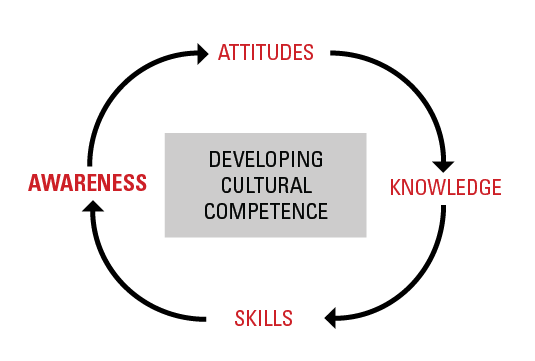
Who are you? What forms your perspective?
- self-examination of one’s own biases towards other cultures and the in-depth exploration of one’s cultural and professional background;
- recognition of aspects of your identity that form your lenses of knowing and understanding your own culture, as well as knowing what other cultures exist;
- reflection on your reactions to and interpretations of people who are of a culture or background significantly different from your own;
- recognition of prejudices and stereotypes that can create barriers for learning and personal development.
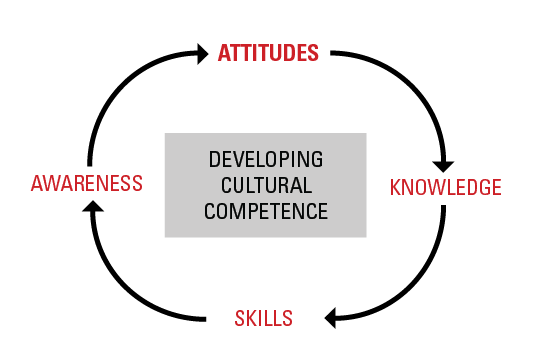
What do you value, believe, fear, etc…?
- exploration of values, belief systems, phobias and one’s adherence to individual cultural norms that impact cross-cultural effectiveness;
- analysis of the extent to which we are open to differing views and opinions; the more we cling to these variables, the more likely we will experience cross-cultural challenges when they collide with cultural differences.
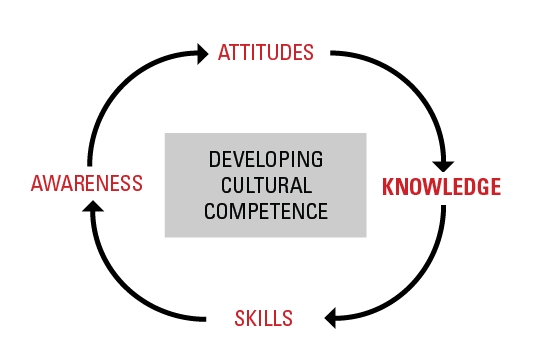
What do you know about others?
- The more knowledge we have about people of different cultures, the more likely we are able to avoid cross-cultural missteps. Knowing how culture impacts problem solving, managing people, asking for help, etc. can keep us connected in cross-cultural interactions (as individuals and organizations).
- Research into human behavior has shown that our values and beliefs about equality may not line up with our actual behaviors and further, we often are ignorant as to the degree of difference between our beliefs and our actions; it has been shown that people who may test well in regard to having low prejudices may in fact act with great prejudice when actually interacting with other cultures. Understanding this disconnect is why knowledge is considered a key aspect of developing one’s own cultural competence.
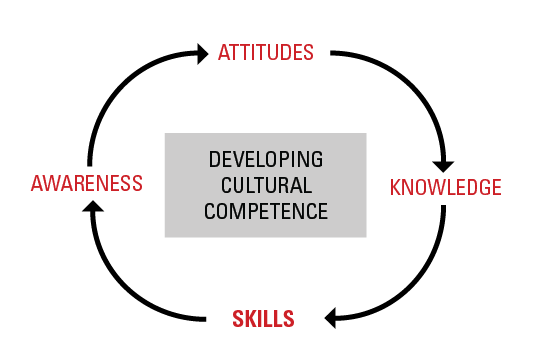
How do you interact with others?
- taking practices of cultural competency and repeating them until they become integrated into one’s daily behaviors; this includes but is not limited to having an excellent grasp of effective and respectful communication, whether within an organization or between individuals (verbal and nonverbal).
- One can have the “right” attitude, considerable self-awareness, and a lot of knowledge about cultural differences, yet still lack the ability to effectively manage differences. If we have not learned skills or have had little opportunity to practice, our knowledge and awareness are insufficient to avoid and manage cross-cultural landmines (adapted from Pedersenʼs Conceptual Framework for Developing Cultural and Cross-Cultural Competence (1994).
Once you begin to integrate all four components into your day-to-day behaviors, your degree of cultural competence will increase dramatically. By being aware of your internal learned biases, having an attitude that reflects a desire to deeply understand your own behavior, showing a high degree of knowledge of the subject and implementing the skills of cultural competency, you will soon move from the realm of theory and learning to that of active practice. As the world becomes more global, the need for a high degree of cultural competence will only grow and in very few (if any) fields, will this not be an important trait. Developing your own cultural competency will help you become more effective in your work at the university.
Dimensions of Cultural Competence
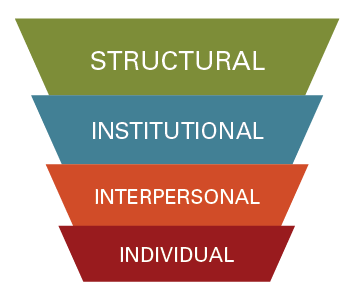
At the structural level, cultural competence is reflected in an awareness of the relationship between social expectations about knowledge and values and the public policies and practices that shape, define and limit both what is accepted and allowed and how individuals and groups have access and opportunity.

At the institutional level, cultural competence is reflected in an understanding of the way social institutions (family, school, church, media, criminal justice system, government, etc.) help to shape and reinforce social norms and expectations related to shared knowledge and values, an understanding of the way social institutions and contemporary cultural issues have been impacted by historical factors, and an ability to engage thoughtfully in critical conversations about those cultural issues, the contributing historical factors, and the differing impact on individuals and groups relative to their respective social positions and identities.

Interpersonal
At the interpersonal level, cultural competence is reflected in an awareness of the differences in the way others think and believe, an appreciation for that diversity of thought and belief, and an ability to engage effectively and respectfully with people who think and believe differently than you.

At the individual level, cultural competence is reflected in an understanding of your own values and how those values influence your thoughts and actions.